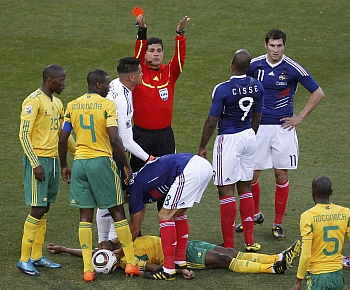 Referees were right 96 percent of the time at the World Cup, according to a study by FIFA's referees' committee.
Referees were right 96 percent of the time at the World Cup, according to a study by FIFA's referees' committee.
The study looked at key decisions such as free kicks, penalties and goal decisions but did not examine minor rulings such as throw-ins.
The data was collected by video examination carried out by referees committee members and FIFA instructors, Jose Maria Garcia-Aranda, head of refereeing for the sport's governing body, told Reuters.
"We are working very hard and we are not surprised with the results we have gained because the level of refereeing is much, much better," he said.
"We have been working with the referees for many years, we have prepared them as well as possible with new technology and video de-briefing," he added.
It marks the first time that FIFA has released such data on refereeing performances and while there is no way to compare with previous tournaments, Garcia-Aranda said he was confident decision making had improved.
"Even without the formal data we can say that the number of good, difficult decisions has been up this year," he said.
"We are talking about thousands of decisions made in 62 games, some of them very, very difficult decisions and the vast majority of them were correct," Garcia-Aranda said, adding that the 'success rate' was higher than for players taking penalties.
TEVEZ GOAL
There were a number of high profile wrong decisions in the tournament such as the failure to award England a goal against Germany when Frank Lampard's shot hit the crossbar and went over the goalline and the missed offside on Carlos Tevez's goal for Argentina against Mexico.
Hungarian referee Viktor Kassai, who took charge of the semi-final between Germany and Spain, said he was not surprised by the figure of 96 percent correct decisions.
"Top referees figures should be around that, it sounds a realistic figure to me," he said.
"The problem always is of course that in a match if you have 200 decisions, if one is wrong and that is a vital one, then no-one cares about the other 199.
"We are like the goalkeepers who can make ten great saves but then let in a howler at the end - which gets remembered? Regardless of the numbers though, we have to aim for faultless performances," he added.













 © 2025
© 2025